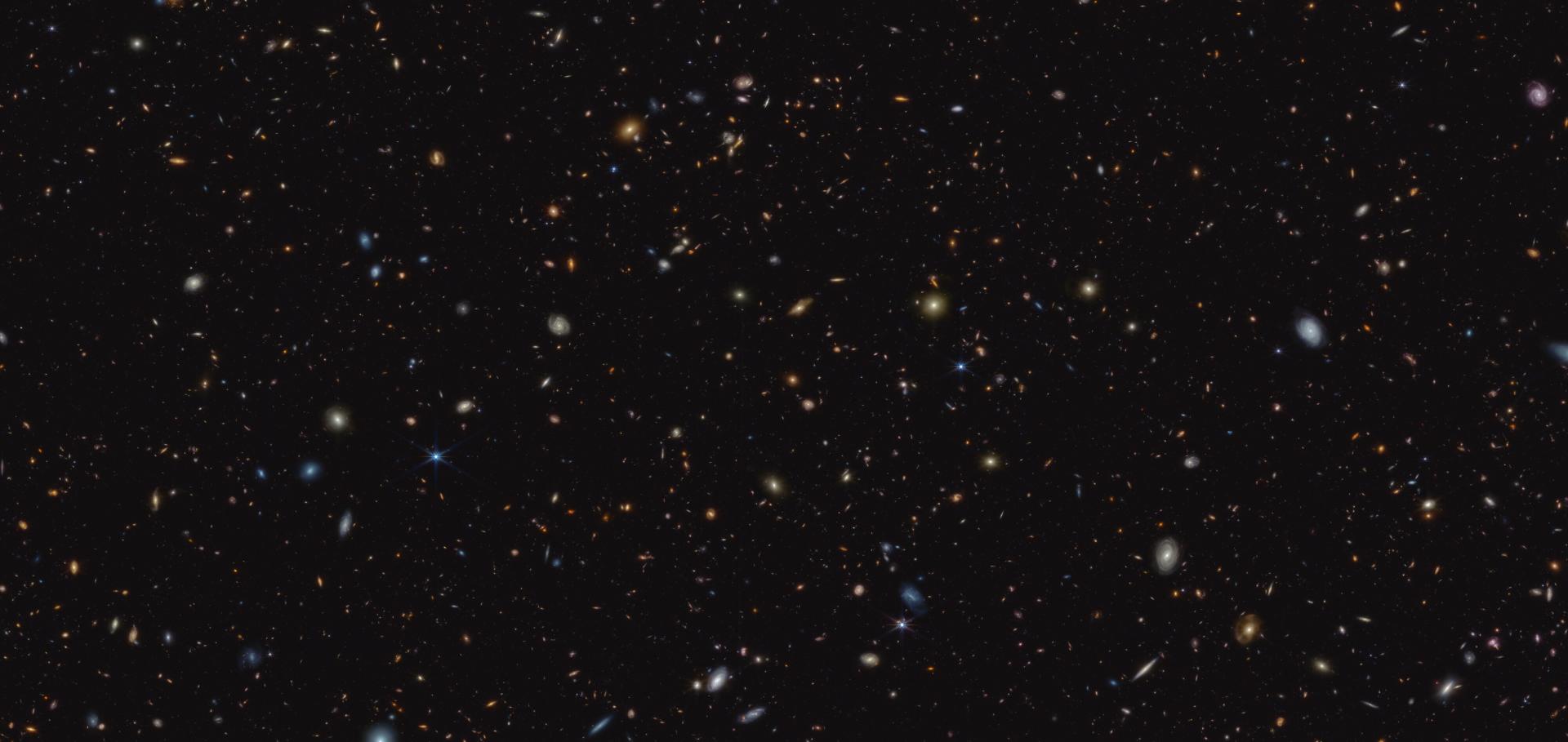The JADES Origins Field: A New JWST Deep Field in the JADES Second NIRCam Data Release
The Astrophysical Journal: Supplement Series American Astronomical Society 281:2 (2025) 50
Abstract:
We summarize the properties and initial data release of the JADES Origins Field (JOF), the longest single pointing yet imaged with the James Webb Space Telescope (JWST). This field falls within the GOODS-S region about 8′ southwest of the Hubble Ultra Deep Field (HUDF), where it was formed initially in Cycle 1 as a parallel field of HUDF spectroscopic observations within the JWST Advanced Deep Extragalactic Survey (JADES). This imaging was greatly extended in Cycle 2 program 3215, which observed the JOF for 5 days in six medium-band filters, seeking robust candidates for z > 15 galaxies. This program also includes ultradeep parallel NIRSpec spectroscopy (up to 91 hr on source, summing over the dispersion modes) on the HUDF. Cycle 3 observations from program 4540 added 20 hr of NIRCam slitless spectroscopy and F070W imaging to the JOF. With these three campaigns, the JOF was observed for 380 open-shutter hours with NIRCam using 15 imaging filters and two grism bandpasses. Further, parts of the JOF have deep 43 hr MIRI observations in F770W. Taken together, the JOF is one of the most compelling deep fields available with JWST and a powerful window into the early Universe. This paper presents the second data release from JADES, featuring the imaging and catalogs from the year 1 JOF observations.JADES reveals a large population of low mass black holes at high redshift
Monthly Notices of the Royal Astronomical Society Oxford University Press (OUP) (2025) staf1979
Abstract:
Abstract JWST has revealed a large population of active galactic nuclei (AGN) in the distant universe, which are challenging our understanding of early massive black hole (BH) seeding and growth. We expand the exploration of this population to lower luminosities by stacking ∼600 NIRSpec grating spectra from the JWST Advanced Deep Extragalactic Survey (JADES) at 3 < z < 7, in bins of redshift, [O iii]5007 luminosity and equivalent width, UV luminosity and stellar mass. In various stacks, we detect a broad component of Hα without a counterpart in [O iii], implying that it is not due to outflows but traces the Broad Line Region of a large population of low-luminosity AGN not detected in individual spectra. The detection, in some stacks, of high [O iii]4363/Hγ, typical of AGN, further confirms the detection of a large population of AGN. We infer that the stacks probe BHs with masses of a few times 106M⊙ accreting at rates L/LEdd ∼ 0.02–0.1, i.e. a low mass and dormant parameter space poorly explored by previous studies on individual targets. We identify populations of BHs that fall within the scatter of the local MBH − M* scaling relation, indicating that there is a population of high-z BHs that are not overmassive relative to their host galaxies. Yet, on average, the stacks are still overmassive relative the local relation, with some of them 1–2 dex above it. We infer that the BH mass function at 3 < z < 5 is consistent with models in which BHs evolve through short bursts of super-Eddington accretion.The z ≳ 9 Galaxy UV Luminosity Function from the JWST Advanced Deep Extragalactic Survey: Insights into Early Galaxy Evolution and Reionization
The Astrophysical Journal American Astronomical Society 992:1 (2025) 63
Abstract:
The high-redshift UV luminosity function provides important insights into the evolution of early galaxies. JWST has revealed an unexpectedly large population of bright (MUV ≲ −20) galaxies at z ≳ 10, implying fundamental changes in the star-forming properties of galaxies at increasingly early times. However, constraining the fainter population (MUV ≳ −18) has been more challenging. In this work, we present the z ≳ 9 UV luminosity function from the JWST Advanced Deep Extragalactic Survey. We calculate the UV luminosity function from several hundred z ≳ 9 galaxy candidates that reach UV luminosities of MUV ∼ −17 in redshift bins of z ∼ 8.5–12 (309 candidates) and z ∼ 12–16 (63 candidates). We search for candidates at z ∼ 16–22.5 and find none. We also estimate the z ∼ 14–16 luminosity function from the z ≥ 14 subset of the z ∼ 12–16 sample. Consistent with other measurements, we find an excess of bright galaxies that is in tension with many theoretical models, especially at z ≳ 12. However, we also find high number densities at −18 ≲ MUV ≲ −17, suggesting that there is a larger population of faint galaxies than expected, as well as bright ones. From our parametric fits for the luminosity function, we find steep faint-end slopes of −2.5 ≲ α ≲ −2.3, suggesting a large population of faint (MUV ≳ −17) galaxies. Combined, the high normalization and steep faint-end slope of the luminosity function could imply that the reionization process is appreciably underway as early as z = 10.Detection of the 2175 Å UV bump at z > 7: evidence for rapid dust evolution in a merging reionization-era galaxy
Monthly Notices of the Royal Astronomical Society Oxford University Press 542:2 (2025) 1136-1154
Abstract:
Dust is a fundamental component of the interstellar medium within galaxies, as dust grains are highly efficient absorbers of ultraviolet (UV) and optical photons. Accurately quantifying this obscuration is crucial for interpreting galaxy spectral energy distributions (SEDs). The extinction curves in the Milky Way (MW) and Large Magellanic Cloud exhibit a strong feature known as the 2175 Å UV bump, most often attributed to small carbonaceous dust grains. This feature was recently detected in faint galaxies out to , suggesting rapid formation channels. Here, we report the detection of a strong UV bump in a luminous Lyman-break galaxy at , GNWY-7379420231, through observations taken as part of the NIRSpec Wide GTO survey. We fit a dust attenuation curve that is consistent with the MW extinction curve within , in a galaxy just Myr after the big bang. From the integrated spectrum, we infer a young mass-weighted age ( Myr) for this galaxy, however spatially resolved SED fitting unveils the presence of an older stellar population ( Myr). Furthermore, morphological analysis provides evidence for a potential merger. The underlying older stellar population suggests the merging system could be pre-enriched, with the dust illuminated by a merger-induced starburst. Moreover, turbulence driven by stellar feedback in this bursty region may be driving polycyclic aromatic hydrocarbon formation through top-down shattering. The presence of a UV bump in GNWY-7379420231 solidifies growing evidence for the rapid evolution of dust properties within the first billion years of cosmic time.JADES – the small blue bump in GN-z11: insights into the nuclear region of a galaxy at z = 10.6
Monthly Notices of the Royal Astronomical Society Oxford University Press 541:3 (2025) 2134-2161


